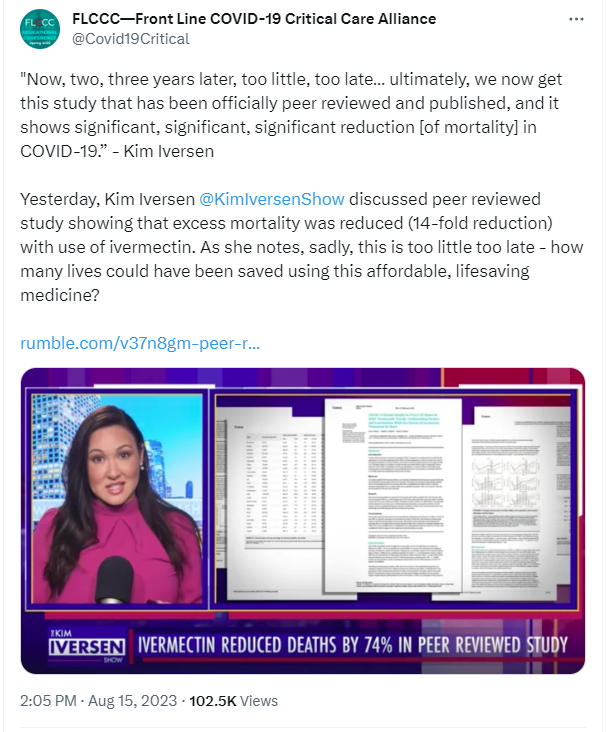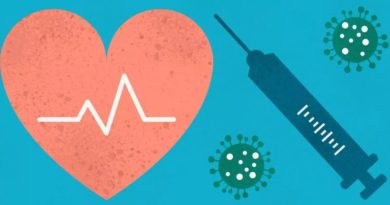Fact Check: Study Does NOT Show Ivermectin Reduces COVID-19 Mortality By 74%

Does an article published in the medical journal Cureus prove that ivermectin reduces COVID-19 mortality by 74 percent? No, that’s not true: A professor of medicine at John Hopkins University School of Medicine told Lead Stories, “The study does not establish a causal role for ivermectin in the fluctuations of death rates in Peru,” adding “the claims seem poorly supported.”
The claims appeared in a post (archived here) published on X, the social media platform formerly known as Twitter, by the FLCCC — Front Line COVID-19 Critical Care Alliance on August 15, 2023. The video it included had the title “IVERMECTIN REDUCED DEATHS BY 74% IN PEER REVIEWED STUDY.” The post’s caption said:
‘Now, two, three years later, too little, too late… ultimately, we now get this study that has been officially peer reviewed and published, and it shows significant, significant, significant reduction [of mortality] in COVID-19.’ – Kim Iversen
Yesterday, Kim Iversen @KimIversenShow discussed peer reviewed study showing that excess mortality was reduced (14-fold reduction) with use of ivermectin. As she notes, sadly, this is too little too late – how many lives could have been saved using this affordable, lifesaving medicine?
This is what the post looked like on Twitter at the time of writing:
(Source: Twitter screenshot taken on Fri Aug 25 15:57:04 2023 UTC)
The article
The post by the FLCCC, an anti-vaccine group that has been cited for perpetuating unsubstantiated claims regarding the COVID virus and the use of ivermectin, links to a video of “The Kim Iverson Show” from August 14, 2023, titled “Peer Reviewed and Published, Too Little Too Late, Ivermectin Worked Against Covid-19.” The same thread on X also links to the article referenced in the post, which is also discussed during Iversen’s podcast:
Link to study: https://t.co/5jPMVv1yZJ
— FLCCC–Front Line COVID-19 Critical Care Alliance (@Covid19Critical) August 15, 2023
Article authors
The authors of the article include Dr. Jennifer A. Hibberd, a dental surgeon; Juan J. Chamie, a data analyst; and David E. Scheim, who has a doctorate in mathematics from MIT and a post-doctoral fellowship in mathematical biology.
Lead Stories reached out to Scheim, the designated author to handle questions and inquiries about the article, to find out if the social media post by FLCCC accurately reflects the findings in their article. In emails on August 27-28, 2023, he said, “This statement is indeed much too simplistic,” adding, “Social media is rarely scientifically precise” and “that it’s typically impossible to advance science through social media posts.”
Still, Scheim stands by the group’s research, which only analyzed data for people age 60 and above. It didn’t look at all age groups. The “Results” section of the article says:
Reductions in excess deaths over a period of 30 days after peak deaths averaged 74% in the 10 states with the most intensive IVM [ivermectin] use. As determined across all 25 states, these reductions in excess deaths correlated closely with the extent of IVM use (p<0.002). During four months of IVM use in 2020, before a new president of Peru restricted its use, there was a 14-fold reduction in nationwide excess deaths and then a 13-fold increase in the two months following the restriction of IVM use.
The U.S. Centers for Disease Control and Prevention says, “Excess deaths are typically defined as the difference between the observed numbers of deaths in specific time periods and expected numbers of deaths in the same time periods.” During the pandemic, excess deaths increased globally due to the impact of COVID.
Scheim said the degree of correlation illustrated in the article, the p value (in this case, p<0.002), exceeds “the standard of proof of efficacy in medical science,” meaning he believes their data support the efficacy of ivermectin as a treatment for COVID-19. In his email, he said:
No scientific paper can ever be considered the absolute last word on any issue, but this comes as close as they come to a definitive result.
Experts
Medical and public health experts disagree with the article’s findings. In an August 29, 2023, email to Lead Stories, Dr. Stuart Ray, who in addition to being a professor of medicine is also the vice chair of medicine for data integrity and analytics at Johns Hopkins Medicine, called the article by Scheim and the other authors a “muddled study” of “poor quality.” He continued:
The study does not establish a causal role for ivermectin in the fluctuations of death rates in Peru. In fact, by design it cannot establish causation – it’s an ecological epidemiological study design, so it’s a study of groups of people in aggregate, ignoring details of which individuals received what treatment and when they did or did not receive ivermectin relative to any illness they might have had before they died. They don’t even report details about what proportion of people in a region received ivermectin. Given reported shortages of ivermectin at the time, it seems unlikely that most people received ivermectin, so the claims seem poorly supported.
Ray continued:
The surges and falls in deaths in Peru will look familiar to anyone who has followed the COVID-19 pandemic curves; the authors of the study do not rigorously address other factors, including simple epidemiological ones, as potential reasons for the changes they observe. As one simple example, they don’t adequately correct for a strong correlation between population and severity that is evident in their data, which could account for much of the observed difference.
Food and Drug Administration
Asked about the claim that a study shows ivermectin reduces COVID mortality by 74 percent, the U.S. Food and Drug Administration took a pass. In an August 25, 2023, email, FDA Press Officer Chanapa Tantibanchachai provided the agency’s response. It said:
Generally, the FDA does not comment on specific studies, but may evaluate them as part of the body of evidence to further our understanding about a particular issue and assist in our mission to protect public health.
In a separate email the same day, the FDA directly addressed whether ivermectin should be used as a treatment for COVID:
Ivermectin is not FDA-approved or authorized for use in preventing or treating COVID-19, nor has the agency stated that it is safe or effective for that use.
An FDA thread on X also vetoed the notion of using the anti-parasitic drug as a COVID treatment. You can see it below:
1) Although FDA has approved ivermectin for certain uses in humans and animals, it has not authorized or approved ivermectin for use in preventing or treating COVID-19, nor has the agency stated that it is safe or effective for that use.
— U.S. FDA (@US_FDA) August 16, 2023
National Institute of Allergy and Infectious Diseases
The National Institute of Allergy and Infectious Diseases at the National Institutes of Health (NIH) also does not endorse ivermectin as a COVID treatment. In an August 28, 2023, email, it told Lead Stories:
The NIH COVID-19 Treatment Guidelines Panel evaluated data from clinical trials testing ivermectin as a potential COVID-19 treatment and recommended against its use for that purpose.
Additional information can be found on the agency’s website.
In closing his email to Lead Stories, Ray added:
I share hope for a cheap, safe, available medication to prevent and treat COVID-19. So far, the available evidence doesn’t suggest that ivermectin is such a drug.
Read more
Additional Lead Stories fact checks of claims involving ivermectin are available here.
Other Lead Stories fact checks of claims about COVID vaccination can be found here.
This article has been archived for your research. The original version from Lead Stories can be found here.



